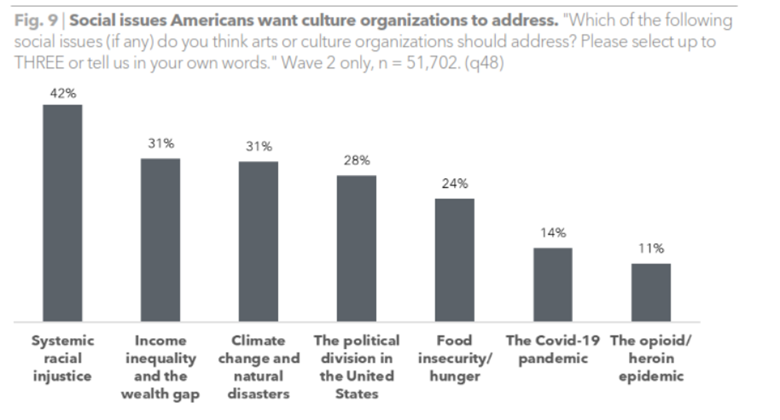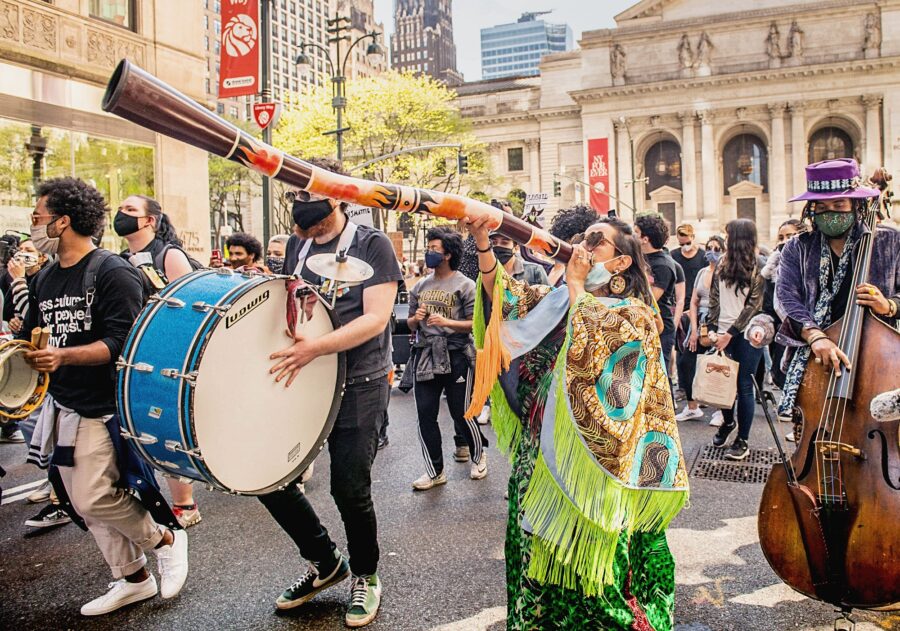News & Notes
Americans want arts & culture organizations to address social issues
I’ve been reflecting on our findings from “Rethinking Relevance, Rebuilding Engagement” for the past few months since co-authoring this report, and I continue to be struck by how many Americans feel arts and culture organizations have a responsibility to address social issues. Our Culture + Community in a Time of Transformation national survey found that more than three-quarters (76%) of Americans believe that arts and culture organizations should be addressing at least one of the social issues we asked about in our survey—which, honestly, surprised me. This was surprising because I’ve talked with many arts organizations who are wary of engaging with social issues because they may be perceived as political or polarizing. When I have seen social issues being addressed it’s frequently been around issues that are viewed universally as a problem such as the opioid/heroin epidemic, which is one of the social issues Americans have the least interest in having arts organizations take on.
While there isn’t a consensus around a single, top-priority issue Americans hope arts organizations will tackle, systemic racial injustice was the most-selected issue, at 42%, followed by income inequality and climate change. This suggests that many Americans want organizations to engage with issues that may be polarizing or challenging when they affect their community and their own lives.

One of the ways that organizations might be able to engage with social issues is by providing a platform for discussion. In a focus group of visitors and non-visitors to a local museum recently, participants shared the idea of institutions facilitating dialogue around the social issues depicted in work around the galleries without necessarily taking a stance as an institution on those issues. They hoped that the discussions could lead to civil and fruitful dialogue around what the ideas mean to people, how they connect to their own lives, with an opportunity to hear and learn from different perspectives. As one participant put it, “A lot of contemporary art pieces have a political statement which opens the floor for people to talk civilly about it and try to come to at least understand some different perspectives.”
Of course, addressing social issues can look many different ways for organizations. This could mean drawing awareness to, increasing knowledge around, and/or facilitating conversations about things affecting individual communities or the nation as a whole. And one size will not fit all organizations or all communities. I think each organization should consider what connections do (or could) exist between their artform or cultural category and the kinds of social issues that matter to your community. But whatever their role, Americans are telling us that arts and culture can, and should, be tackling issues affecting their communities. I encourage institutions reflect on what matters to their communities, to think about their mission in light of this kind of service, and to explore opportunities to expand the ways in which they’re addressing social issues.
I’d love to hear your thoughts about the role arts and culture organizations can play in addressing social issues—concerns you have, issues you care about, issues that matter to you community, etc.—please be in touch.
Photo: Generously provided by NYC-based photographer Deb Fong (debfong.com, IG @deb_fong_photography), this photo was taken on May 1, 2021 at Broadway United for Racial Justice, an action hosted by Unite NY and organized by Rodrick Covington and Clive Destiny. Performers including Russell Hall marched with supporters from the New York Public Library through Manhattan to passionately unite this creative community against racism.

